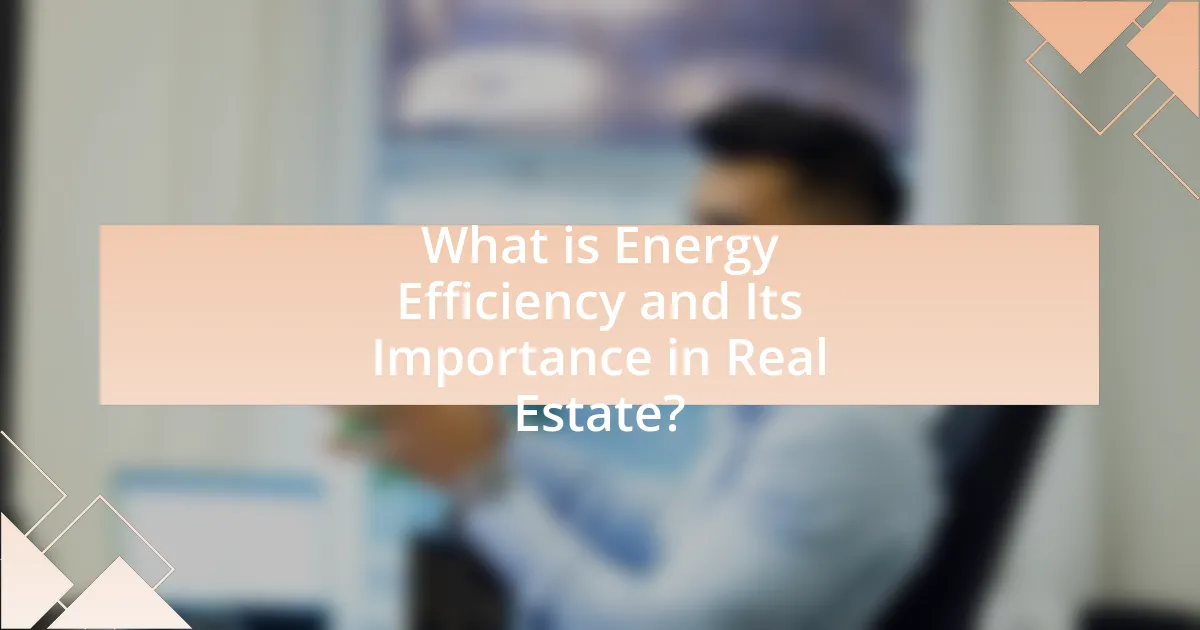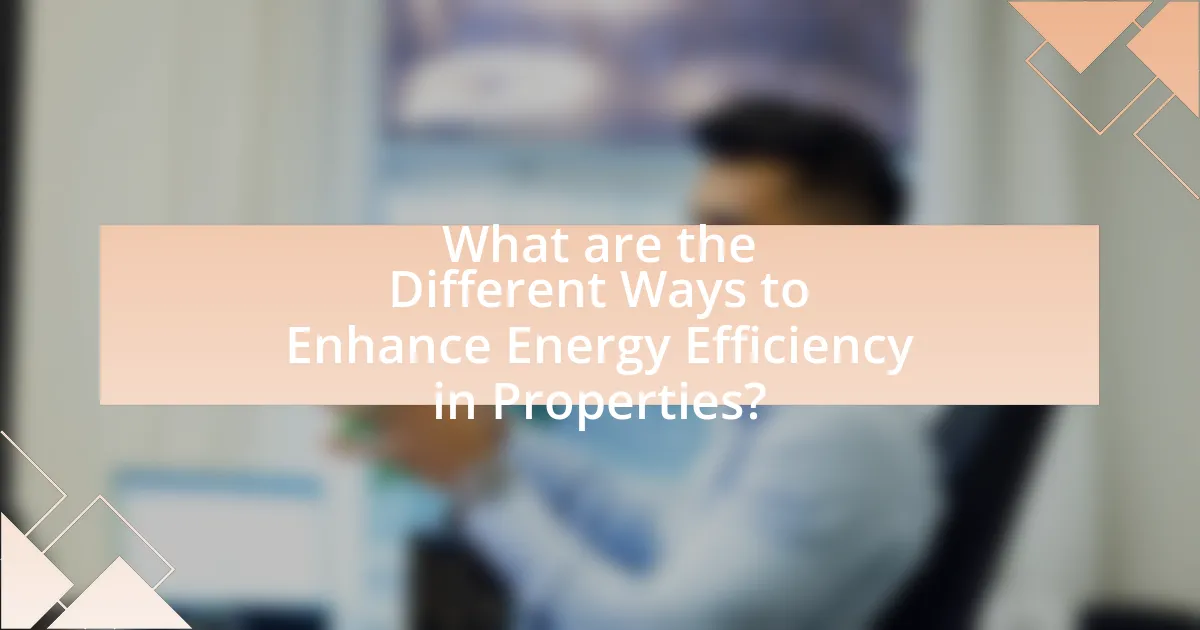Energy efficiency is the practice of using less energy to achieve the same level of service, which plays a crucial role in real estate by influencing property value and operational costs. Energy-efficient properties often attract buyers and renters due to lower utility bills and a reduced environmental impact, leading to increased marketability and potential resale values. Key factors affecting energy efficiency include insulation quality, energy-efficient windows, and HVAC system performance. The article explores how energy-efficient features enhance buyer perception, the financial benefits of investing in energy efficiency, and the growing demand for sustainable living options in the real estate market. Additionally, it discusses practical steps property owners can take to improve energy efficiency and the long-term advantages of such investments.

What is Energy Efficiency and Its Importance in Real Estate?
Energy efficiency refers to the practice of using less energy to provide the same level of service or output, which is crucial in real estate as it directly impacts property value and operational costs. Properties that are energy efficient often have lower utility bills, which can make them more attractive to potential buyers or renters, thereby enhancing their marketability. According to the U.S. Department of Energy, energy-efficient homes can sell for 3-5% more than comparable homes, demonstrating a clear financial incentive for both homeowners and investors. Additionally, energy-efficient buildings contribute to sustainability efforts, reducing environmental impact and aligning with increasing consumer demand for eco-friendly living spaces.
How does energy efficiency impact property value?
Energy efficiency positively impacts property value by reducing operating costs and increasing market appeal. Properties with energy-efficient features, such as high-efficiency appliances, insulation, and renewable energy systems, often command higher prices due to lower utility bills and a reduced environmental footprint. According to a study by the U.S. Department of Energy, homes with Energy Star ratings can sell for up to 10% more than comparable homes without such certifications. This correlation between energy efficiency and property value is further supported by research from the National Association of Realtors, which indicates that 61% of homebuyers consider energy-efficient features important in their purchasing decisions.
What are the key factors that determine energy efficiency in properties?
The key factors that determine energy efficiency in properties include insulation quality, energy-efficient windows, HVAC system performance, and the use of renewable energy sources. Insulation quality affects heat retention and loss, with well-insulated properties requiring less energy for heating and cooling, thus improving efficiency. Energy-efficient windows, such as double or triple-glazed options, minimize heat transfer, contributing to lower energy consumption. The performance of heating, ventilation, and air conditioning (HVAC) systems is crucial, as modern, efficient systems can significantly reduce energy usage compared to older models. Additionally, the integration of renewable energy sources, like solar panels, can enhance energy efficiency by providing sustainable energy options, further decreasing reliance on non-renewable energy. These factors collectively influence a property’s overall energy efficiency and can lead to reduced utility costs and increased property value.
How do energy-efficient features influence buyer perception?
Energy-efficient features significantly enhance buyer perception by signaling lower utility costs and environmental responsibility. Buyers often prioritize homes with energy-efficient attributes, such as high-efficiency appliances and insulation, as these features suggest long-term savings and reduced carbon footprints. According to a study by the National Association of Realtors, 61% of homebuyers consider energy efficiency an important factor in their purchasing decision, indicating that such features can lead to quicker sales and potentially higher offers. This trend reflects a growing awareness of sustainability and cost-effectiveness among consumers, making energy-efficient homes more attractive in the real estate market.
Why is energy efficiency becoming a priority for property owners?
Energy efficiency is becoming a priority for property owners due to its potential to reduce operational costs and increase property value. By implementing energy-efficient measures, property owners can significantly lower utility bills, with studies indicating that energy-efficient buildings can save up to 30% on energy costs. Additionally, properties with energy-efficient features often attract higher rental rates and resale values, as buyers increasingly prioritize sustainability. According to the U.S. Green Building Council, green buildings can command a 7% higher sale price compared to traditional buildings, demonstrating the financial benefits of energy efficiency in real estate.
What are the financial benefits of investing in energy efficiency?
Investing in energy efficiency provides significant financial benefits, including reduced energy costs and increased property value. Energy-efficient buildings can lower utility bills by 20% to 30%, as reported by the U.S. Department of Energy, which translates to substantial savings over time. Additionally, properties with energy-efficient features often command higher market prices; studies indicate that energy-efficient homes can sell for 3% to 5% more than their less efficient counterparts. This increase in value is driven by growing consumer demand for sustainable living options and the long-term cost savings associated with lower energy consumption.
How does energy efficiency contribute to sustainability and environmental impact?
Energy efficiency significantly contributes to sustainability and reduces environmental impact by minimizing energy consumption and lowering greenhouse gas emissions. When buildings and systems utilize energy more effectively, they require less energy from fossil fuels, which are major contributors to climate change. For instance, according to the U.S. Department of Energy, improving energy efficiency in buildings can reduce energy use by 30% to 50%, leading to substantial decreases in carbon dioxide emissions. This reduction not only helps in mitigating climate change but also conserves natural resources, promoting a more sustainable environment.

What are the Different Ways to Enhance Energy Efficiency in Properties?
To enhance energy efficiency in properties, implement measures such as upgrading insulation, installing energy-efficient windows, utilizing smart thermostats, and incorporating renewable energy sources like solar panels. Upgrading insulation can reduce heating and cooling costs by up to 20%, while energy-efficient windows can decrease energy loss by 30-50%. Smart thermostats optimize energy use by adjusting temperatures based on occupancy, leading to further savings. Additionally, integrating solar panels can significantly lower electricity bills and increase property value, as homes with solar energy systems can sell for an average of 4.1% more than those without.
What types of upgrades can improve energy efficiency?
Upgrades that can improve energy efficiency include installing energy-efficient windows, upgrading insulation, and replacing old heating and cooling systems with high-efficiency models. Energy-efficient windows reduce heat loss and gain, which can lower heating and cooling costs by 7-15% according to the U.S. Department of Energy. Upgrading insulation in walls, attics, and floors can also significantly reduce energy consumption, with proper insulation potentially saving homeowners up to 20% on heating and cooling bills. Additionally, replacing outdated HVAC systems with ENERGY STAR-rated models can improve efficiency by 10-50%, further enhancing energy savings and property value.
How do insulation and windows affect energy consumption?
Insulation and windows significantly impact energy consumption by regulating heat transfer in buildings. Proper insulation minimizes heat loss in winter and heat gain in summer, reducing the need for heating and cooling systems, which account for approximately 50% of energy use in residential buildings. Energy-efficient windows, such as double or triple-glazed options, further enhance this effect by providing better thermal performance and reducing air leakage. According to the U.S. Department of Energy, upgrading insulation and windows can lead to energy savings of 10% to 50%, depending on the existing conditions and climate.
What role do energy-efficient appliances play in property value?
Energy-efficient appliances significantly enhance property value by attracting environmentally conscious buyers and reducing long-term utility costs. Properties equipped with these appliances often command higher sale prices; for instance, a study by the National Association of Realtors found that homes with energy-efficient features can sell for 3-5% more than comparable homes without them. Additionally, energy-efficient appliances contribute to lower energy bills, making the property more appealing to potential buyers who prioritize cost savings.
How can property owners assess their energy efficiency?
Property owners can assess their energy efficiency by conducting an energy audit, which evaluates energy consumption and identifies areas for improvement. This process typically involves analyzing utility bills, inspecting insulation, checking heating and cooling systems, and assessing the efficiency of appliances. According to the U.S. Department of Energy, energy audits can reveal potential savings of 5% to 30% on energy bills, highlighting the financial benefits of improving energy efficiency. Additionally, using tools like energy monitoring devices can provide real-time data on energy usage, further aiding property owners in their assessment.
What tools and resources are available for energy audits?
Energy audits utilize various tools and resources to assess energy consumption and identify efficiency improvements. Common tools include energy modeling software like EnergyPlus and RETScreen, which simulate energy use and evaluate potential savings. Additionally, infrared thermography cameras detect heat loss, while data loggers monitor energy usage patterns over time. Resources such as the U.S. Department of Energy’s Energy Saver Guide and the American Society of Heating, Refrigerating and Air-Conditioning Engineers (ASHRAE) standards provide guidelines and best practices for conducting thorough energy audits. These tools and resources collectively enhance the accuracy and effectiveness of energy audits, leading to improved energy efficiency and property value.
How can homeowners identify areas for improvement?
Homeowners can identify areas for improvement by conducting a comprehensive energy audit of their property. This audit assesses energy consumption patterns, identifies inefficiencies, and highlights opportunities for upgrades, such as insulation, windows, and HVAC systems. According to the U.S. Department of Energy, homes can lose 30% of their energy through inadequate insulation and air leaks, making it crucial for homeowners to pinpoint these issues to enhance energy efficiency and property value.

What are the Market Trends Related to Energy Efficiency and Property Value?
Market trends indicate that energy efficiency significantly enhances property value, with studies showing that homes with high energy efficiency ratings can sell for 5% to 15% more than similar homes without such ratings. The increasing consumer demand for sustainable living and lower utility costs drives this trend, as buyers are willing to pay a premium for properties that offer long-term savings and environmental benefits. Additionally, the integration of energy-efficient technologies, such as solar panels and smart home systems, is becoming a standard expectation in the real estate market, further boosting property values. According to the National Association of Realtors, 61% of homebuyers consider energy efficiency an important factor in their purchasing decisions, underscoring the growing importance of energy-efficient features in determining property value.
How is the demand for energy-efficient properties changing?
The demand for energy-efficient properties is increasing significantly as consumers become more environmentally conscious and seek to reduce energy costs. According to a 2022 report by the National Association of Realtors, 61% of homebuyers expressed a preference for energy-efficient features, indicating a growing trend towards sustainability in real estate. This shift is driven by rising energy prices and government incentives promoting green building practices, which further enhance the appeal of energy-efficient properties in the market.
What demographic factors influence the preference for energy-efficient homes?
Demographic factors influencing the preference for energy-efficient homes include age, income level, education, and family size. Younger individuals, particularly millennials, show a stronger preference for energy-efficient homes due to their environmental awareness and desire for sustainable living. Higher income levels correlate with a greater likelihood of purchasing energy-efficient homes, as these properties often come with higher upfront costs but promise long-term savings. Education also plays a significant role; individuals with higher educational attainment tend to prioritize energy efficiency, understanding its benefits for both the environment and utility costs. Additionally, families with children may prefer energy-efficient homes for their potential to reduce energy bills and create a healthier living environment. Studies indicate that 75% of millennials are willing to pay more for energy-efficient features, highlighting the impact of these demographic factors on housing preferences.
How do government incentives affect the market for energy-efficient properties?
Government incentives significantly boost the market for energy-efficient properties by increasing demand and enhancing property values. These incentives, such as tax credits, rebates, and grants, lower the upfront costs for buyers and investors, making energy-efficient homes more financially attractive. For instance, a study by the National Renewable Energy Laboratory found that homes with energy-efficient features sold for an average of 3-5% more than similar homes without such features, demonstrating a direct correlation between government incentives and increased property values.
What are the long-term benefits of energy efficiency for property owners?
Energy efficiency provides significant long-term benefits for property owners, primarily through reduced operational costs and increased property value. By implementing energy-efficient systems and practices, property owners can lower utility bills, with studies indicating potential savings of 20-30% on energy costs. Additionally, energy-efficient properties often have higher market values; a report from the U.S. Department of Energy shows that homes with energy-efficient features can sell for 3-5% more than comparable homes without such features. Furthermore, energy-efficient properties tend to attract more tenants and buyers, as they align with growing consumer preferences for sustainability, leading to lower vacancy rates and increased rental income.
How does energy efficiency impact resale value over time?
Energy efficiency positively impacts resale value over time by making properties more attractive to buyers, who increasingly prioritize sustainability and lower utility costs. Homes with energy-efficient features, such as high-efficiency appliances, insulation, and renewable energy systems, often command higher prices in the market. According to a study by the National Association of Realtors, 61% of homebuyers consider energy-efficient features important, and homes with these features can sell for 5-10% more than similar homes without them. Additionally, energy-efficient homes tend to sell faster, as they appeal to a growing demographic focused on environmental responsibility and long-term savings.
What are the potential savings on utility bills for energy-efficient properties?
Energy-efficient properties can save homeowners between 20% to 50% on utility bills compared to standard homes. This significant reduction is primarily due to improved insulation, energy-efficient appliances, and advanced heating and cooling systems that consume less energy. For instance, the U.S. Department of Energy reports that energy-efficient upgrades can lead to annual savings of approximately $200 to $400 for an average household. These savings not only lower monthly expenses but also enhance the overall value of the property, making energy efficiency a financially beneficial investment.
What practical steps can property owners take to enhance energy efficiency?
Property owners can enhance energy efficiency by implementing measures such as upgrading insulation, installing energy-efficient windows, and utilizing smart home technology. Upgrading insulation in walls, attics, and floors can reduce heating and cooling costs by up to 20%, according to the U.S. Department of Energy. Installing energy-efficient windows can decrease energy loss by 12% to 25%, as reported by the Efficient Windows Collaborative. Additionally, smart home technology, including programmable thermostats and energy monitoring systems, can optimize energy use and lead to savings of 10% to 30% on energy bills, as indicated by the American Council for an Energy-Efficient Economy. These steps not only improve energy efficiency but also increase property value by making homes more attractive to potential buyers.
What are the best practices for implementing energy-efficient upgrades?
The best practices for implementing energy-efficient upgrades include conducting an energy audit, prioritizing upgrades based on cost-effectiveness, and utilizing high-quality materials and technologies. An energy audit identifies areas of energy loss and potential improvements, allowing property owners to focus on the most impactful upgrades. Prioritizing upgrades, such as insulation, energy-efficient windows, and HVAC systems, based on their return on investment ensures that resources are allocated effectively. Using high-quality materials and technologies, such as ENERGY STAR-rated appliances, enhances durability and efficiency, ultimately leading to greater energy savings and increased property value. According to the U.S. Department of Energy, energy-efficient upgrades can reduce energy costs by 20-30%, demonstrating their financial benefits.
How can property owners effectively market their energy-efficient features to potential buyers?
Property owners can effectively market their energy-efficient features to potential buyers by highlighting the cost savings and environmental benefits associated with these features. For instance, showcasing energy-efficient appliances, insulation, and renewable energy sources can demonstrate lower utility bills, which studies show can save homeowners an average of 30% on energy costs annually. Additionally, providing documentation such as energy performance certificates and utility bills can substantiate claims of efficiency and savings. Marketing strategies should also include emphasizing the increasing demand for sustainable living, as a survey by the National Association of Realtors found that 61% of homebuyers consider energy efficiency important in their purchasing decisions.